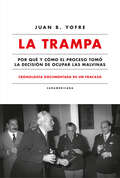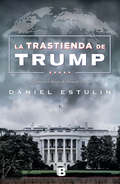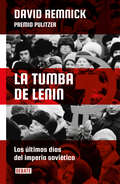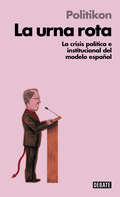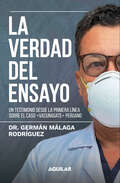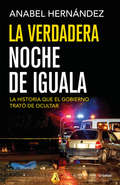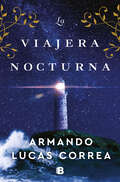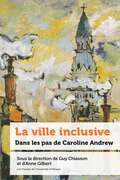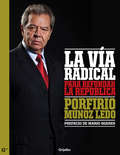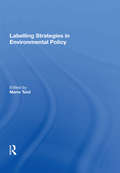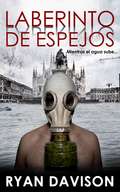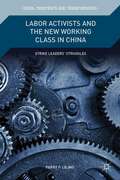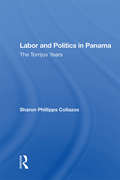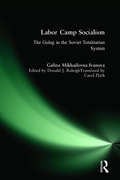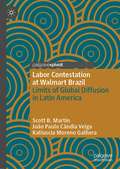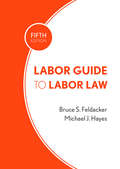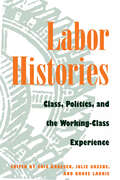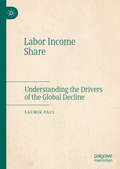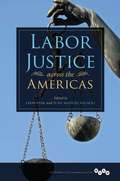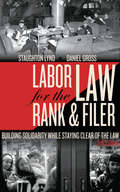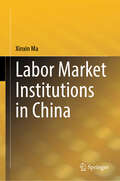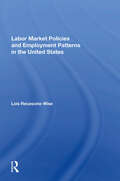- Table View
- List View
La trampa. Cronología documentada de un fracaso: Por qué y cómo el Proceso tomó la decisión de ocupar las Malvinas
by Juan B. YofreA 40 años de Malvinas, Tata Yofre revela fuentes y documentos inéditos que explican cómo la dictadura argentina que estaba en el poder desde 1976 tomó la decisión de invadir las islas para revertir el creciente descrédito popular que amenazaba acabar con ella y en ese mismo gesto firmó su propia condena llevando al país a una aventura suicida. La invasión de las Islas Malvinas el 2 de abril de 1982 marca la culminación de un proceso que se inicia hacia fines de 1981 cuando, frente al estrepitoso fracaso del gobierno del teniente general Roberto Eduardo Viola, la Junta Militar toma conciencia de que su poder empieza a tener los días contados. Es en ese momento que el almirante Jorge Isaac Anaya y el teniente general Leopoldo Fortunato Galtieri conciben la idea de ocupar el archipiélago para concitar adhesión popular y revertir la agonía del Proceso de Reorganización Nacional. Sólo un fenomenal desconocimiento de las relaciones internacionales pudo hacer que se imaginara que semejante empresa -que virtualmente comportaba declararle la guerra al Reino Unido, a la OTAN y a los Estados Unidos- podía tener éxito. Esa fue la trampa que la dictadura tendió a la sociedad argentina y este es el primer libro que describe pormenorizadamente su arquitectura y sus entretelones a partir de una decena de archivos privados que no habían visto la luz pública hasta hoy y de documentos argentinos y extranjeros inéditos. A cuarenta años de Malvinas, Yofre lo hace de nuevo: revela hechos y testimonios que necesaria y dolorosamente reescriben otra tragedia argentina.
La trastienda de Trump
by Daniel Estulin¿Quién está detrás de Donald Trump? Desde el inicio de su carrera presidencial, Donald Trump, con un discurso en extremo xenófobo y antisistema, logró sortear todos los obstáculos hasta ser elegido presidente de la mayor democracia del orbe. ¿Cómo es posible que este individuo demencial haya conseguido tal hazaña? ¿Quién lo apoyó para llegar a la Casa Blanca? ¿Qué cambios geopolíticos le esperan al mundo? Daniel Estulin, haciendo uso de sus conocimientos de exespía ruso y disponiendo de información de primera mano, nos ofrece en este libro una crónica apasionante en la que revela pormenores, personajes, intereses políticos y empresariales que están detrás de la llegada de Trump al poder. Las fisuras entre demócratas y republicanos, el nuevo orden mundial, el negocio multimillonario de la droga, las conexiones con Rusia, el papel de las agencias de inteligencia, la orquestación de distintos gobiernos son algunos de los temas que esta rigurosa investigación trae a cuenta para entender todo lo que implica que Donald Trump sea el presidente de la nación más poderosa de la historia moderna. Así, quien lea estas páginas, sabrá que todo está encaminado hacia una transformación radical, de la cual Trump es apenas la punta del iceberg.
La tumba de Lenin: Los últimos días del Imperio Soviético
by David RemnickUna extraordinaria crónica del colapso del imperio soviético, con un nuevo epílogo del autor. David Remnick es el mejor periodista de su generación y La tumba de Lenin es el libro que le consagró y con el que obtuvo el premio Pulitzer, el más alto galardón para un periodista. Inédito en España y con un nuevo prefacio para conmemorar los veinte años de la caída de la Unión Soviética, es un clásico del periodismo y una de las obras fundamentales sobre ese periodo histórico, clave para entender el mundo de hoy. Corresponsal en Moscú del Washington Post desde 1988 hasta 1992, Remnick fue un testigo privilegiado del hundimiento de la Unión Soviética. A partir de sus viajes por el país y sus conversaciones con ciudadanos soviéticos de todos los estratos de la sociedad, refleja el impacto histórico de ese momento, el redescubrimiento del pasado tras setenta años de dictadura comunista y el derrumbe de un sistema hasta entonces aparentemente inexpugnable. Una obra maestra del mejor periodismo narrativo. Reseñas:«Una extraordinaria combinación de observación, trabajo, conocimiento y análisis. Es imposible imaginar un libro mejor sobre el declive de la Unión Soviética.»The New York Times Book Review «La mejor crónica de la caída del imperio soviético.»Washington Post Book World
La urna rota: La crisis política e institucional del modelo español (Libros para entender la crisis #Volumen)
by PolitikonYa los antiguos faraones rezaban para tener buenas cosechas, porque en los malos tiempos la sociedad inevitablemente cuestiona el sistema de gobierno. La crisis actual no ha sido ajena a este fenómeno, al contrario, más allá de eslóganes como el "No nos representan", en España el interés por la política ha aumentado exponencialmente. Igual que ocurrió con la prima de riesgo, debates sobre sistemas electorales o mecanismos de selección de elites surgen en los lugares más insospechados: cafés, calles y hogares.Es unánime la necesidad de reformar la política, al fin y al cabo de un túnel nunca se sale por el mismo lugar por donde se entra, pero hay pocos diagnósticos fiables sobre lo que no funciona y aun menos información sólida sobre las ventajas y los inconvenientes de posibles cambios.La urna rota pretende precisamente eso: identificar los principales problemas de nuestro sistema político y aventurar algunas soluciones de modo que podamos gobernar mejor nuestro presente y nuestro futuro; porque no es un libro para salir de la crisis sino para evitar volver a esta situación.
La verdad del ensayo
by Germán Málaga RodríguezEl doctor Germán Málaga Rodríguez cuenta, con lujo de detalles, su versión de los acontecimientos. Desde su trabajo en la primera línea de atención de los enfermos por el COVID-19 hasta el estallido del escándalo mediático El médico e investigador Germán Málaga Rodríguez tuvo la misión de liderar el ensayo clínico para probar la eficacia de las candidatas a vacunas del laboratorio chino Sinopharm, el estudio más importante y ambicioso en este campo que se haya realizado en la historia del país. No obstante, las denuncias periodísticas que desembocaron en el caso «Vacunagate» peruano lo convirtieron en el blanco de la virulencia mediática y de graves acusaciones que nunca pudieron ser demostradas. En este libro, el doctor Málaga cuenta, con lujo de detalles, su versión de los acontecimientos. Desde su trabajo previo en la primera línea de atención de los enfermos de la COVID-19 y el inicio del ensayo clínico, hasta el estallido del escándalo mediático y los entretelones de las controversiales inoculaciones del expresidente Martín Vizcarra, entre otras autoridades y funcionarios. El testimonio del Doctor Málaga busca ahondar en cómo ocurrieron los hechos de un polémico caso que sacudió a la opinión pública. Se trata de un material fundamental para entender y determinar si realmente se cometió un acto de injusticia contra el autor de estas páginas, y para reflexionar sobre la posverdad y las narrativas que agobian nuestro tiempo.
La verdadera noche de Iguala: La historia que el gobierno trató de ocultar
by Anabel HernándezAnte acontecimientos como el del 26 de septiembre de 2014, ningún país puede seguir adelante sin conocer la verdad a la que tienen derecho las víctimas y la sociedad.Los hechos de Iguala nos obligan a reflexionar sobre el momento que vive México: retratan con crudeza la degradación de las instituciones cuya obligación es procurar justicia y protegernos; al mismo tiempo nos retratan como sociedad, muestran cuáles son nuestros temores más profundos, pero también nuestras esperanzas. En medio de la polarización y la soledad que se vive en un país como México, la gente ha comenzado a olvidar que el dolor que la injusticia provoca a los otros debiera ser nuestro propio dolor.En esta investigación el lector recorrerá el laberinto del caso, sus trampas, su oscuridad y la luz. Llegará a la calle Juan N. Álvarez, verá los casquillos y las sandalias tiradas en el suelo. Entrará en la Normal Rural "Raúl Isidro Burgos", escuchará las intensas voces de sus estudiantes, algunas veces llenas de valor y orgullo, otras de miedo y soledad. Viajará a los sórdidos lugares donde se aplicaron infames torturas para fabricar culpables, así como a las oficinas de altos funcionarios donde se ejecutó el encubrimiento. Asimismo, conocerá de viva voz los testimonios de aquellos que recibieron jugosas ofertas de dinero para que se culparan y culparan a otros, y así cerrar el incómodo caso. Finalmente, vislumbrará en las voces de los testigos la desesperación de las víctimas durante las horas del exterminio, el coraje de los sobrevivientes y las lágrimas de los que fueron desaparecidos. -Anabel Hernández-
La viajera nocturna
by Armando Lucas CorreaDel autor del best seller La niña alemana nos llega esta conmovedora novela en la que cuatro generaciones de mujeres experimentan amores, pérdidas, guerras y esperanzas en una historia que va desde el surgimiento del nazismo en Alemania hasta la Revolución cubana y la caída del Muro de Berlín. Berlín, 1931: La joven poeta Ally Keller da a luz a solas a Lilith, una niña mestiza. Mientras los Nazis ascienden al poder, Ally sabe que debe mantener a su bebé oculta para protegerla de la ideología de la raza aria promovida por Hitler. Pero a medida que Lilith crece, cada vez resulta más difícil protegerla... Hasta que un día Ally decide poner en marcha un plan desesperado para enviar a su hija a un lugar seguro al otro lado del océano. La Habana, 1958: Lilith, ya adulta, conserva pocos recuerdos de su madre o de su infancia en Alemania y, aunque ahora está muy ilusionada con su futuro al lado de Martín, un piloto cubano con fuertes lazos con el gobierno de Fulgencio Batista, al estallar la Revolución se encuentra en una encrucijada junto a su hija recién nacida, Nadine. Berlín, 1988: Nadine se ha convertido en una científica que se dedica a velar por la dignidad de de quienes fueron asesinados por los Nazis. Sin embargo, lleva toda la vida sin afrontar la verdad sobre la historia de su familia. Será su hija, Luna, quien la animará a indagar sobre las decisiones que tomaron su madre y su abuela para asegurar su supervivencia. Además, Luna deberá aceptar una traición desconcertante que cambiará todo lo que creía saber sobre sus antepasados. Cuatro mujeres de varias generaciones unidas por el sacrificio se embarcan en sus propios viajes de autodescubrimiento y se convierten en testimonios de la fuerza del amor materno.
La ville inclusive: Dans les pas de Caroline Andrew (Politique et politiques publiques)
by Geneviève TellierLa ville inclusive : dans les pas de Caroline Andrew is a festschrift in honour of this researcher's exceptional contributions, which follow a common thread—the inclusive city. Her interests extended from population studies to politics, with an emphasis on municipal governance, particularly through her interest in the influence of various “equity-seeking groups,” an expression she coined. In this volume, specialists in urban studies offer their own opinions on contemporary urbanity in the wake of her trailblazing research. It includes thorough analyses of inclusion policy issues Canadian cities face daily, unpublished case studies, and useful observations and proposals for decision making at the city level. La ville inclusive is one of those rare French-language books that tackles the issue of inclusion. It acts as a multidisciplinary meeting place in which to discuss the over-riding challenge of togetherness in a world that is increasingly urbanized and fragmented.
La vía radical: para refundar la República
by Porfirio Muñoz LedoEl autor arremete contra la inercia, la torpeza y la impunidad de los poderes institucionales, denunciando que todas las crisis que hemos vivido y estamos viviendo se deben a que la Reforma del Estado ha sido abortada y que sólo se conseguirá asumiendo una postura drástica (la vía radical) para imponer desde abajo las nuevas reglas del juego democrático que desde hace años le urgen a la República. La vía radical es una obra que exalta la Política así, con mayúsculas, su naturaleza, opuesta al mercado y ligada a la Constitución y la democracia, su nobleza como actividad humana de la más alta consideración y la importancia de su primacía para romper con el pasado y acelerar consistentemente los cambios que reclama el país. Fruto de la vasta experiencia del autor tanto en la diplomacia como en el acontecer nacional, este libro expone sobre México, con lucidez y amplia documentación, la forma en que el Estado actual linda con el caos, el tránsito de unatecnocracia aventurera hacia una cleptocracia mediocre, el quebranto del sistema electoral, la urgente necesidad de erradicar del ejercicio del poder la potestad del dinero (el verdadero trasfondo de la inseguridad ciudadana y el desamparo económico), para finalmente revelar los entretelones de una reforma del Estado abortada que, nos dice el autor, hoy es más apremiante que nunca. La ilegitimidad y el fraude que campearon tanto en 2008 como en 2006, explica, han debilitado la soberanía, han colocado por encima de ella los intereses privados y han entregado al extranjero las decisiones estratégicas. Frente a la clara inclinación hacia la izquierda vivida en los más recientes comicios en América Latina, incluidos los de México, el actual gobierno bonsai persiste en su defensa del dogma neoliberal. La crisis a la que nos ha llevado determina que éste es el momento de replantear el sistema de representación y de devolver el poder a la ciudadanía, para abordar en serio la extensa nómina de grandes reformas, refundar las instituciones y cimentar, sobre bases renovadas, la formación, el ejercicio y la distribución del poder; esto es, la nueva República.
Labelling Strategies in Environmental Policy
by Mario TeislEco-labelling programmes have been in existence for many years but their recent growth now extends to many products and services. The academic literature has grown in response and there have been several theoretical and empirical advances. This volume presents the best of previously published research on the design and effects of eco-labelling programmes. Whilst concentrating on the economic literature, the articles also approach the topic from a psychological, sociological and political point of view. Part One focuses on a range of theoretical developments, Part Two on empirical measurements of the effectiveness of eco-labelling, Part Three on the factors that influence the success and design of eco-labelling programmes and Part Four on the effects of eco-labelling on international trade and development.
Laberinto De Espejos
by Ryan Davison Julia Vélez ArdaizPersuasión subliminal mientras el mundo se hundeFrank se gana la vida manipulando las opiniones de la gente en su trabajo de redactor creativo. Es contratado por su talento para ayudar a ganar las elecciones a un político que odia, ¿podrá revelarse su mente ante tantos hechos injustos? Su pareja y amor verdadero lo llama para reclamar su propia consciencia.Un futuro cercano, una mini novela sobre distopía y ciencia ficción:- Cambio climático y calentamiento global- Capitalismo- Consumismo- Persuasión subliminal e influencias, sobre todo en la publicidad- Cómo de fuerte es el hechizo de la publicidad y cómo influye en nuestros pensamientos- Contaminación del medio ambiente- Contaminación mental y emocional- La gran cantidad de envases y otros desechos que la sociedad tira- Campañas electorales en los mediosSi alguna vez te has sentido frustrado por el rechazo de la sociedad consumista hacia un estilo de vida menos materialista en beneficio del planeta, o si alguna vez te has sentido frustrado por esa sensación de no importa cuánto trabajes o cuánto dinero ganes nunca te siente feliz del todo, o si alguna vez te has sentido influenciado por la publicidad en contra de tu voluntad... te verás reflejado en Laberinto de Espejos.
Labor Activists and the New Working Class in China
by Parry P. LeungLabor Activists and the New Working Class in China is an ethnographic work examining an export jewelry industrial district in Pearl River Delta of China. While well known that China is undergoing an unprecedented capitalist transformation, few have noted the new working class of China are also actively striving to alter their fate through labor struggles. Parry Leung lived for twelve months in the migrant worker dwelling sites, and kept close contact with the strike activists. Leung illuminates how strikes emerge and transform in an authoritarian state, by enhancing our understanding on the informal agency power of strike organizers in labor activism.
Labor And Politics In Panama: The Torrijos Years
by Sharon Phillipps CollazosThis book provides a profile of Panama's political elite and analyzes the country's fragile political institutions. It presents a study of the power relations among Panama's political elite, the business sector and labour.
Labor Camp Socialism: The Gulag in the Soviet Totalitarian System (The\new Russian History Ser.)
by Donald J. Raleigh Galina Mikhailovna Ivanova Galina Mikhailovna Carol A. FlathThis is the first historical survey of the Gulag based on newly accessible archival sources as well as memoirs and other studies published since the beginning of glasnost.Over the course of several decades, the Soviet labor camp system drew into its orbit tens of millions of people -- political prisoners and their families, common criminals, prisoners of war, internal exiles, local officials, and prison camp personnel. This study sheds new light on the operation of the camp system, both internally and as an integral part of a totalitarian regime that "institutionalized violence as a universal means of attaining its goals". In Galina Ivanova's unflinching account -- all the more powerful for its austerity -- the Gulag is the ultimate manifestation of a more pervasive and lasting distortion of the values of legality, labor, and life that burdens Russia to the present day.
Labor Contestation at Walmart Brazil: Limits of Global Diffusion in Latin America (Governance, Development, and Social Inclusion in Latin America)
by Scott B. Martin João Paulo Veiga Katiuscia Moreno GalheraThis book explores how and why the labor practices of the world’s largest employer, supermarket giant Walmart, were contested by unions and government regulators as it expanded to Latin America starting in the 1990s. With an in-depth case study of Brazil, and a comparative chapter examining Argentina, Chile, and Mexico, this book analyzes the problematic encounter between diffusion of home-office anti-labor practices and evolving national institutional contexts that are quite varied and in some cases enable considerable resistance by unions and/or regulators. Walmart’s “repressive familial” and “anti-union” model is found to generate costs and conflicts that contributed to its unprofitability and ultimate exit from Brazil in 2018. This experience, contrasted with country situations where Walmart’s overall competitive and labor and human resource practices “fit” better with national markets and institutions, underlines the brittle, problematic nature of diffusionist corporate models lacking adaptive capacity to significant cross-national variations across host countries.
Labor Divided in the Postwar European Welfare State
by Dennie Oude NijhuisThis book explains how the success of attempts to expand the boundaries of the postwar welfare state in the Netherlands and the United Kingdom depended on organized labor's willingness to support redistribution of risk and income among different groups of workers. By illuminating and explaining differences within and between labor union movements, it traces the historical origins of 'inclusive' and 'dual' welfare systems. In doing so, the book shows that labor unions can either have a profoundly conservative impact on the welfare state or act as an impelling force for progressive welfare reform. Based on an extensive range of archive material, this book explores the institutional foundations of social solidarity.
Labor Economics and Industrial Relations: Markets and Institutions (Wertheim Publications In Industrial Relations)
by Clark Kerr Paul D. StaudoharIn twenty-three original essays this book surveys the course of labor economics over the more than two centuries since the publication of Adam Smith's Wealth of Nations. It fully examines the contending theories, changing environmental contexts, evolving issues, and varied policies affecting labor's participation in the economy. Beginning with George P. Shultz, who provides the foreword, the contributors are among the most distinguished scholars in labor economics and industrial relations. These essays represent some of their finest work and apply the ideas for which they are best known. <P><P>Highlights include John T. Dunlop on internal labor markets, John Kenneth Galbraith on power relationships in the economy, Robert M. Solow on explanation of unemployment, Jacob Mincer on human capital, Lloyd G. Reynolds on labor in developing countries, Richard A. Lester on wage differentials, Edward F. Denison on productivity, Richard Freeman on union/non-union differentials, F. Ray Marshall on human resource development, and Thomas A. Kochan on policy making. While the intellectual framework of the book looks partly to the past - explaining the labor factor in classical and neoclassical systems - its emphasis is on contemporary problems that will figure prominently in future developments, such as the operation of internal labor markets, dispute resolution, concession bargaining, equal employment opportunity, and individual labor contracting. This book is required reading for students and scholars of labor economics.
Labor Guide to Labor Law
by Bruce S. Feldacker Michael J. HayesLabor Guide to Labor Law is a comprehensive survey of labor law in the private sector, written from the labor perspective for labor relations students and for unions and their members. This thoroughly revised and updated fifth edition covers new statutes, current issues, and the latest developments in labor and employment law. The text emphasizes issues of greatest importance to unions and employees. Where the law permits a union to make certain tactical choices, those choices are pointed out. Material is included on internal union matters that tend to be ignored in management texts. Bruce S. Feldacker and Michael J. Hayes cover applicable labor law principles from a union's initial organizing campaign to the mature bargaining relationship, including such subjects as the employee right to engage in protected concerted activity, the duty to bargain, labor arbitration, the use of strikes, picketing and other economic weapons in resolving a labor dispute, the duty of fair representation, internal union regulation, and employment discrimination. This book is also a useful reference and review for full-time union officers and representatives who have a working knowledge of labor law but wish to brush up on certain points as needed in their work. Both authors have extensive experience in the construction field, and they have been careful to include material on those aspects of labor law that are unique to that field. Labor Guide to Labor Law is structured to present an unbiased and comprehensive explanation of labor law principles for anyone interested in the field. Thus, labor relations educators, as well as practitioners in the field representing labor, management, or individual employees, should also find the text suitable for their use. Each chapter includes a summary, review questions and answers, a restatement of "Basic Legal principles" with citations to key cases, and a bibliography for additional research.
Labor Histories: Class, Politics, and the Working-Class Experience (Working Class in American History)
by Peter Rachleff Gunther Peck James R. Barrett Tera W. Hunter Shelton Stromquist Bruce Laurie Reeve Huston Cecelia Bucki Kathryn J Oberdeck Kimberley L. Phillips Ileen A DeVaultIs class outmoded as a basis for understanding labor history? This collection emphatically answers, "No!" These thirteen essays delve into subjects like migrant labor, religion, ethnicity, agricultural history, and gender. Written by former students of preeminent labor figure and historian David Montgomery, the works advance the argument that class remains indispensable to the study of working Americans and their place in the broad drama of our shared national history.
Labor Income Share: Understanding the Drivers of the Global Decline (Adb Institute Series On Development Economics Ser.)
by Saumik PaulThis book is about labor income share, which measures the share of national income paid in wages. The global share of income going towards labor is declining, which suggests a more unequal distribution of income. This has sparked debates about fair distribution of personal incomes among academics and policymakers alike. This book joins the discussion by bringing together recent developments in theoretical and empirical research on labor income share and novel insights on the measurement of the labor income share. The aim of this book is to help design policies to reduce inequality and provide useful knowledge to academics, policymakers from government agencies, policy aides in research institutions and think tanks, and broader audiences from public and private organizations.
Labor Justice across the Americas
by Leon Fink Juan PalacioOpinions of specialized labor courts differ, but labor justice undoubtedly represented a decisive moment in worker 's history. When and how did these courts take shape? Why did their originators consider them necessary? Leon Fink and Juan Manuel Palacio present essays that address these essential questions. Ranging from Canada and the United States to Chile and Argentina, the authors search for common factors in the appearance of labor courts while recognizing the specific character of the creative process in each nation. Their transnational and comparative approach advances a global perspective on the various mechanisms for regulating industrial relations and resolving labor conflicts. The result is the first country-by-country study of its kind, one that addresses a defining shift in law in the first half of the twentieth century. Contributors: Rossana Barragán Romano, Angela de Castro Gomes, David Díaz-Arias, Leon Fink, Frank Luce, Diego Ortúzar, Germán Palacio, Juan Manuel Palacio, William Suarez-Potts, Fernando Teixeira da Silva, Victor Uribe-Urán, Angela Vergara, and Ronny J. Viales-Hurtado.
Labor Law for the Rank & Filer: Building Solidarity While Staying Clear of the Law (Pm Press Ser.)
by Staughton Lynd Daniel GrossBlending cutting-edge legal strategies for winning justice at work with a theory of dramatic, bottom-up social change, this practical guide to workers' rights aims to make work better while reinvigorating the labor movement. A powerful organization model called "solidarity unionism" is explained, showing how the labor force can avoid the pitfalls of the legal system and utilize direct action to win fair rights. The new edition includes new cases governing fundamental labor rights and can be used not only by union workers, but can serve as a guerrilla legal handbook for any employee in this unstable economy.
Labor Law, Industrial Relations, and Employee Choice
by Richard N. Block John Beck Daniel H. KrugerDiscusses workplace conditions of the 1990s.
Labor Market Institutions in China
by Xinxin MaThis book examines labor market policy and institutional reforms and their impact on outcomes in the Chinese labor market, utilizing both institutional and empirical study perspectives. It furnishes readers with academic evidence essential for comprehending the transformation of labor policies and institutions within the Chinese context—an emerging market economy housing one of the largest workforces globally. The main content of this book is divided into two parts: (i) Social institutions and labor market policies, encompassing topics such as trade unions and union wage premiums, minimum wage regulations and wage distributions, labor contracts, employment security and the high education expansion policy. (ii) Wage and employment institutions in the workplace, including areas such as seniority wages, mandatory retirement systems, the wage-experience profile, the dual labor market phenomenon, discrimination against women and minority ethnic workers, work hours, work-family conflict, job satisfaction, and the influences of Communist Party of China membership on managerial promotions. This book presents academic evidence on these issues, grounded in institutional transition background, economic theories, and empirical studies. It draws upon various Chinese nationwide representative survey datasets. This book is highly recommended for readers interested in institutional transitions, seeking up-to-date and in-depth empirical studies on the associations between labor policies/institutions and labor market outcomes. It particularly appeals to those with an interest in the Chinese economy, labor policymakers, scholars with a background in econometric analysis, and managers in companies.
Labor Market Policies And Employment Patterns In The United States
by Lois Recascino WiseThe United States lacks a comprehensive and coordinated labor market policy. The components of U.S. labor market policy are derived from the activities and programs of many different agencies and Congressional committees. In addition to the Department of Labor, major aspects of labor market policy are sponsored by the Departments of Health and Human Services and Education, and the Social Security and Veterans Administrations. There is no centralized authority over these various activities and there is no one administrative agency responsible for the implementation of active labor market policies. This study seeks to evaluate the effectiveness of U.S. labor market policies that are presented and social and political barriers to policy impact are discussed.
